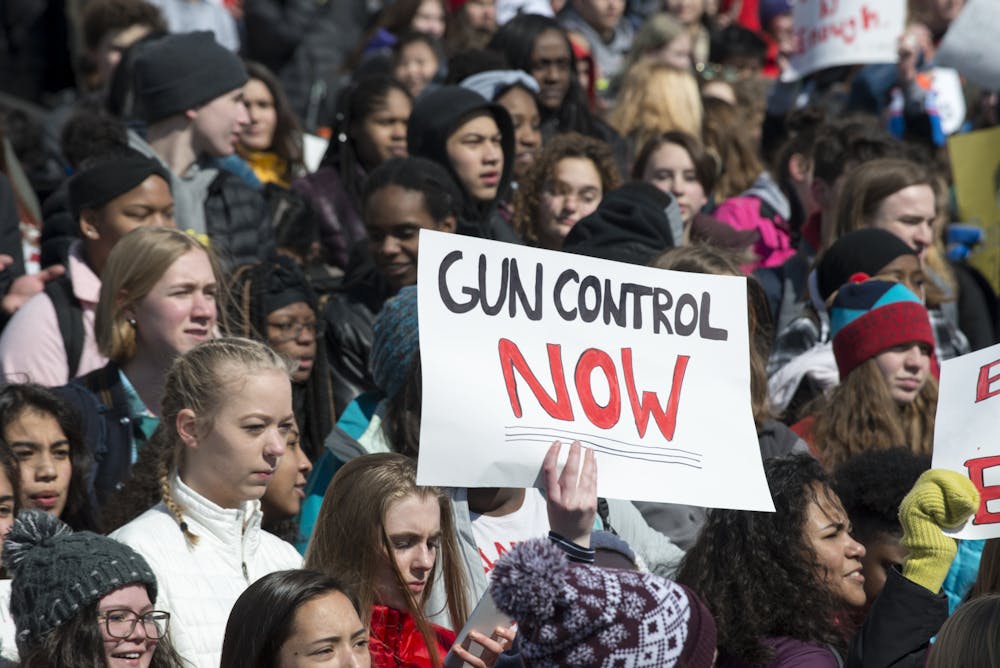Content warning: The following article includes topics some readers may find triggering, including gun violence.
As soon as the holiday season came to a close, the grim reality of gun violence in America once again reared its head. We didn’t even have time to take down our Christmas trees before headlines were filled with tragedy after tragedy — this past January was the worst January on record for mass shootings, both in terms of frequency and the number of casualties.
Last week, on Feb. 13, a gunman at Michigan State University (MSU) killed three students, leaving a campus in mourning. The next day was the 5-year anniversary of the massacre of 17 people at Marjory Stoneman Douglas (MSD) High School in Parkland, Florida. In the wake of these events, it’s imperative to reflect on how gun violence impacts our generation.
The 1999 massacre at Columbine High School is considered a watershed moment in the country’s history. Since then, there have been 366 more shootings, with over 338,000 students directly impacted. Beyond this number, there are countless students who have grown up seeing school shootings on the news and attending homeroom in fear.
Most undergrads were in elementary school themselves when the Sandy Hook Elementary gunman killed 26 people, including 20 children. We were in high school during the shootings at MSD and Sante Fe High School. Now we’re in college, and the senseless violence hasn’t stopped. This is why the current class of undergraduates, while known to most as Generation Z, has also been dubbed “the mass shooting generation.”
For a few students at MSU, this wasn’t even their first school shooting. Some students had previously experienced the shootings at Oxford High School in suburban Detroit, which had a shooting in 2021, or Sandy Hook.
Even for those of us who have fortunately never experienced gun violence, many of us still harbor a fear of being involved in a shooting. After all, a Brady Foundation report notes that, on average, 321 people are shot daily in the U.S.
According to the American Psychological Association, the endless cycle of mass shootings has created a collective trauma, where one-third of adults say that they now avoid certain places out of fear. The specter of mass shootings looms large over endless public spaces: churches, synagogues, concerts, schools, movie theaters, grocery stores, bars, dance studios and nightclubs.
The fear of a mass shooting may be higher in those who are more likely to experience hate crimes. The Federal Bureau of Investigation says these crimes are motivated by the perpetrator’s bias against a particular race, color, religion, national origin, sexual orientation, gender identity, disability or gender.
Over the past five years, shootings motivated by hatred of a particular group have included a grocery store shooting in a predominantly Black neighborhood of Buffalo, Atlanta spa shootings that killed six Asian women and a shooting at an El Paso Walmart that targeted Hispanic immigrants.
When it comes to guns, the U.S. is in a unique position. We make up 4% of the world’s population, yet account for 73% of mass shootings over the past three decades. We are the only nation in the world to have more guns than people. Nearly three-quarters of American gun owners say they could never see themselves not owning a gun. Gun culture is part of our national culture.
The link between guns and violence in this country is abundantly clear. Firearms recently became the leading cause of death for children in the U.S. and gun owners are more than four times as likely to be shot in an assault. Yet, nearly a third of U.S. adults believe there would be less crime if more people owned guns.
Opponents of gun control frequently tout the “good guy with a gun” theory. However, Right to Carry laws, which allow individuals to possess concealed firearms, lead to an increase in gun violence. Further, the rate of deaths in school shootings is almost three times higher for schools with armed guards.
Another common argument against gun control is that criminals don’t follow the law, so gun restrictions will only hurt law-abiding citizens. But the majority of mass shooters — including those who targeted MSD, Pittsburgh’s Tree of Life Synagogue and the Buffalo and El Paso supermarkets — obtained their guns legally.
Researchers, including at Hopkins, are trying to find solutions to the complicated issue of gun violence, but these proposed solutions won’t mean anything if we don’t demand action from our legislators and government.
Our representatives should have our best interests at heart, and that means keeping us alive. Instead, a mere 29 Republicans in Congress voted in favor of a gun safety bill last year. Elected officials claim to represent their constituents. With 71% of Americans in support of stricter gun control laws, it’s time our representatives put their votes where their mouths are.
Though they may not be able to change the laws, institutions should also do more to address the trend of gun violence and be proactive about safety measures. These may include threat assessment programs, crisis response teams and clear emergency plans.
We keep thinking every mass shooting tragedy is going to be the one to “wake America up,” but we cannot hope a headline will motivate the country to agree on gun control. We must keep pushing for a safer nation, keeping the epidemic of gun violence in mind even when victims’ faces aren’t on the evening news.
The Counseling Center may be contacted by calling (410) 516-8278 from 8:30 a.m. to 5 p.m. Monday through Friday. A counselor is also available 24/7 at that same number in emergency situations.
Student Outreach and Support is available for appointments and can be contacted at (410) 516-7857 or at studentoutreach@jhu.edu.
A Place to Talk is available for in-person support Sunday through Thursday. Members are available from 7 p.m. to 1 a.m. in Brody Learning Commons 4010 and from 7 p.m. to 11 p.m. in Wolman Hall.
TimelyMD’s TalkNow service is available 24/7 and can be accessed by visiting timelycare.com/jhu.
Students may contact their resident advisors or residence directors or visit the Residential Life Office. Residential Life can be contacted by phone at (410) 516-8283 or by email at residentiallife@jhu.edu.
Editor’s note: A previous version of this article incorrectly stated that January 2023 was the worst month on record for mass shootings.
The News-Letter regrets this error.





